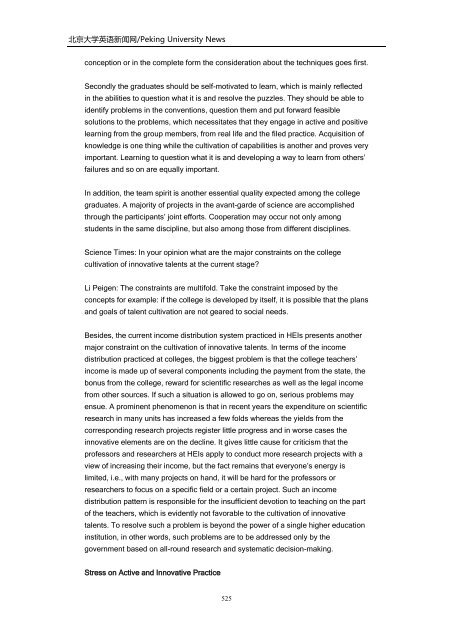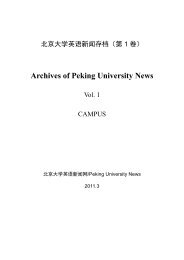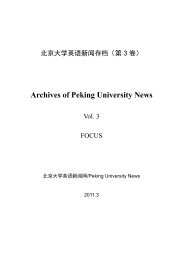Archives of Peking University News - PKU English - 北京大学
Archives of Peking University News - PKU English - 北京大学
Archives of Peking University News - PKU English - 北京大学
You also want an ePaper? Increase the reach of your titles
YUMPU automatically turns print PDFs into web optimized ePapers that Google loves.
<strong>北京大学</strong>英语新闻网/<strong>Peking</strong> <strong>University</strong> <strong>News</strong><br />
conception or in the complete form the consideration about the techniques goes first.<br />
Secondly the graduates should be self-motivated to learn, which is mainly reflected<br />
in the abilities to question what it is and resolve the puzzles. They should be able to<br />
identify problems in the conventions, question them and put forward feasible<br />
solutions to the problems, which necessitates that they engage in active and positive<br />
learning from the group members, from real life and the filed practice. Acquisition <strong>of</strong><br />
knowledge is one thing while the cultivation <strong>of</strong> capabilities is another and proves very<br />
important. Learning to question what it is and developing a way to learn from others‘<br />
failures and so on are equally important.<br />
In addition, the team spirit is another essential quality expected among the college<br />
graduates. A majority <strong>of</strong> projects in the avant-garde <strong>of</strong> science are accomplished<br />
through the participants‘ joint efforts. Cooperation may occur not only among<br />
students in the same discipline, but also among those from different disciplines.<br />
Science Times: In your opinion what are the major constraints on the college<br />
cultivation <strong>of</strong> innovative talents at the current stage?<br />
Li Peigen: The constraints are multifold. Take the constraint imposed by the<br />
concepts for example: if the college is developed by itself, it is possible that the plans<br />
and goals <strong>of</strong> talent cultivation are not geared to social needs.<br />
Besides, the current income distribution system practiced in HEIs presents another<br />
major constraint on the cultivation <strong>of</strong> innovative talents. In terms <strong>of</strong> the income<br />
distribution practiced at colleges, the biggest problem is that the college teachers‘<br />
income is made up <strong>of</strong> several components including the payment from the state, the<br />
bonus from the college, reward for scientific researches as well as the legal income<br />
from other sources. If such a situation is allowed to go on, serious problems may<br />
ensue. A prominent phenomenon is that in recent years the expenditure on scientific<br />
research in many units has increased a few folds whereas the yields from the<br />
corresponding research projects register little progress and in worse cases the<br />
innovative elements are on the decline. It gives little cause for criticism that the<br />
pr<strong>of</strong>essors and researchers at HEIs apply to conduct more research projects with a<br />
view <strong>of</strong> increasing their income, but the fact remains that everyone‘s energy is<br />
limited, i.e., with many projects on hand, it will be hard for the pr<strong>of</strong>essors or<br />
researchers to focus on a specific field or a certain project. Such an income<br />
distribution pattern is responsible for the insufficient devotion to teaching on the part<br />
<strong>of</strong> the teachers, which is evidently not favorable to the cultivation <strong>of</strong> innovative<br />
talents. To resolve such a problem is beyond the power <strong>of</strong> a single higher education<br />
institution, in other words, such problems are to be addressed only by the<br />
government based on all-round research and systematic decision-making.<br />
Stress on Active and Innovative Practice<br />
525




